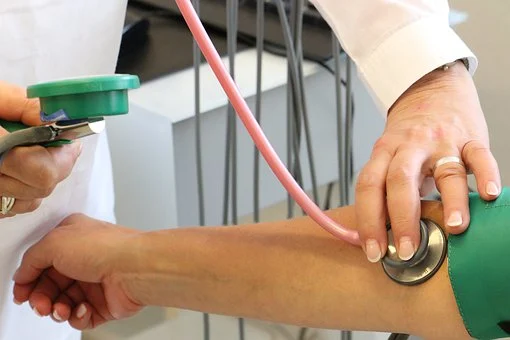
There is a valid reason why high blood pressure, often known as hypertension, is the "silent killer." It generally goes unnoticed, yet it poses a significant risk of heart disease and stroke. Unfortunately, these disorders are also among the most common causes of mortality.
Two factors determine your blood pressure - the amount of blood that your heart pumps and resistance to blood flow in your arteries. For example, the blood pressure will be higher if your arteries are narrowed. A blood pressure reading of less than 120/80 mm Hg is normal but 130/80 mm Hg or above is not normal.
If the blood pressure level is above normal but less than 130/80 mm Hg, you will most likely fall in the elevated blood pressure category. This indicates that you are at risk of developing higher blood pressure. But the good news is that elevated blood pressure will motivate you to change your lifestyle, what you eat and what you do etc., which will control your blood pressure level to a great extent. On that note, here are six ways by which you can reduce not only blood pressure but also maintain good health.
Take CBD to Control Blood Pressure
Stress, salt intake, and alcohol and cigarette usage may be reduced naturally to lower blood pressure. According to new research, CBD has been linked to reducing blood pressure and has fewer adverse effects than pharmaceutical drugs. CBD decreases blood pressure by lowering cortisol levels and dilating blood vessels, allowing more blood to circulate and lower blood pressure. Thus, using the most affordable pod devices will come to your aid. But keep into account to buy it from a reputed store to ensure the quality.

Consume More Fruits, Vegetables and Whole Grains
Several studies have also shown that eating a healthy diet rich in fruits and vegetables protects against the country's leading killers: cancer, diabetes, heart disease, and stroke. These nutrient-dense jewels are high in antioxidants and anti-inflammatory substances, which aid in the body's natural defense mechanism and cell protection. Choose a variety of veggies to get the most of its nutrients since each vegetable contains a distinct blend of beneficial plant components.
Whole grains rich in fiber help control cravings and enhance your favorite foods' flavor. In addition, studies suggest that a diet heavy in whole grains like quinoa and other ancient grains, oatmeal, and brown rice can help prevent heart disease, high blood pressure, diabetes, and several cancers.
Because they're high in vitamins, minerals, and disease-fighting plant chemicals like phytosterols, lignans, and antioxidants, they're a good source of vitamins, minerals, and disease-fighting plant chemicals. Furthermore, some of these nutrients are unavailable elsewhere. So opt for 100 percent whole grain or whole wheat on food labels, and avoid anything with wheat flour or white flour as the first component.

Regular Exercise and Maintaining a Healthy Weight
Regular exercise can help maintain a healthy weight and reduce blood pressure. It would help if you strived to receive at least two and half hours of moderate-intensity aerobic activity each week, or 1 hour and 15 minutes of vigorous-intensity aerobic exercise per week. Obesity or being overweight raises your chances of high blood pressure. Maintaining a healthy weight can aid in managing high blood pressure and prevent other health concerns.

Limit the Intake of Sodium
Limiting your salt or sodium intake is one of the most critical things you can do to keep your blood pressure in check. According to heart-healthy living standards, staying below 2,300 mg of sodium per day (the amount in 1 teaspoon of salt) is usually suggested. However, even if you keep away from the saltshaker, that might be a difficult task. Sodium may be found in packaged and processed foods. One whole dill pickle, for example, may contain 500 to 800 mg of salt. You can avoid the obvious offenders by reading labels and ingredient lists.
Avoiding Alcohol Intake and Smoking
Too much alcohol intake may cause your blood pressure to rise faster. It also adds more calories, perhaps leading to weight gain. Therefore, you must limit yourself to drinking only one or two glasses of alcohol to stay healthy. Cigarette smoking also elevates blood pressure and increases your heart attack and stroke risk. Don't start smoking if you don't already. If you smoke, speak with your health care physician about the best method to quit.
Consume More Potassium
Potassium deficiency is common in a diet heavy in fast meals, processed foods, carbs, potatoes, and meat, contributing to high blood pressure. A daily potassium intake of 3,000 to 3,500 mg is advised from meals like bananas, tomatoes, and other vegetables.
If you have a severe renal illness, you should avoid consuming too much potassium since your kidneys may not excrete it. On the other hand, increasing your potassium consumption to recommended levels can lower your blood pressure by 4 to 5 millimeters of mercury if you have hypertension.
Wrapping Up
The majority of the time, high blood pressure has no symptoms. So the only way to find out whether you have it is to get your blood pressure checked regularly by your doctor. Before establishing a diagnosis, they will take two or more readings at different times. Choose one or more approaches that have stood the test of time if you are serious about employing natural ways to decrease blood pressure.